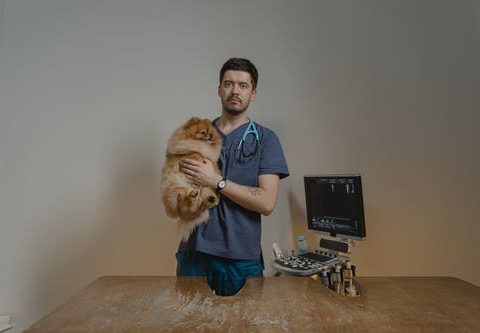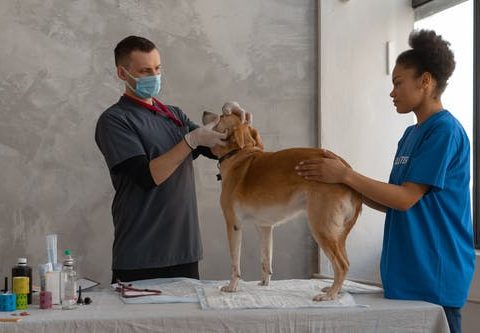Just like us, our furry friends need proper dental care to maintain overall health. But pet owners often overlook this crucial aspect of animal well-being. When advanced dental issues arise, specialized veterinary dental treatments become necessary.
These procedures go beyond regular cleanings, involving intricate work such as root canals, extractions, and even orthodontics. In this article, we’ll dive into the world of specialized veterinary dentistry and discuss who is qualified to perform these treatments. We’ll also explore what pet parents can do to ensure their pets get the best possible dental care.
The Qualifications for Veterinary Dentists
Education and Training
Veterinary dentists are like the orthodontists for animals. They undergo extensive education and training, starting with a veterinary degree, followed by years of specialized training in animal dentistry. This training involves mastering various procedures, understanding dental anatomy, and becoming proficient in dental disease diagnostics.
Certifications and Specializations
Veterinary dentists are often board-certified specialists who’ve passed rigorous exams after their advanced training. They may hold titles such as Diplomate of the American Veterinary Dental College. Meanwhile, veterinary technicians often receive additional training to assist in dental procedures, ensuring that your pet is in good hands throughout the treatment.
Understanding Different Veterinary Dental Procedures
- Cleaning and Scaling: These procedures help prevent periodontal disease by removing plaque and tartar.
- Extractions: Sometimes necessary for severely damaged or decayed teeth to prevent further pain and infection.
- Orthodontic Procedures: To correct bite issues that could cause pain or difficulty eating.
- Endodontic Treatments: Including root canals to treat infected or fractured teeth.
- Periodontal Surgery: For advanced gum disease treatment.
- Restorative Procedures: Such as crowns or fillings to repair damaged teeth.
Protecting Your Pet’s Smile
Addressing dental issues early can prevent the need for specialized treatments. Keeping an eye out for signs of dental distress, such as bad breath, bleeding gums, or difficulty eating, is key. If these symptoms appear, it’s time for a check-up.
Early Attention to Pet Dental Needs
As responsible pet owners, we should prioritize regular vet visits, which often start with considerations such as dog vaccinations. While focusing on these essential health steps, don’t overlook your pet’s mouth. These check-ups are the perfect opportunity to discuss your pet’s dental health and schedule regular cleanings.
The Role of General Practice Veterinarians in Dental Health
General practice veterinarians are the first line of defense against dental problems in pets. They can perform basic dental exams and cleanings, and when something more complex surfaces, they won’t hesitate to refer you to a specialist.
Referral to a Veterinary Dentist
Understanding the Referral Process
If your vet recommends seeing a specialist, they will guide you through how to prepare for the referral and what documents or previous medical records are needed.
What to Expect During the First Visit
Upon visiting a veterinary dentist, anticipate a thorough oral exam and possibly X-rays or dental imaging to determine the best course of action.
Special Considerations for Dental Surgery in Animals
Anesthesia and Monitoring
Dental surgery on pets commonly requires anesthesia. Veterinarians take precautions to minimize risks and ensure the safest experience for your pet.
Post-operative care and Pain Management
The care your pet receives after dental surgery is critical. Pain management is a major focus to ensure your pet’s comfort during the recovery process.
Pet Dental Specialties
When considering specialized care, the field of pet dental services stands out. Advanced technology and techniques are paving the way for superior oral health outcomes for pets, making it an important field within veterinary medicine.
Choosing the Right Veterinary Dental Specialist
Factors to Consider When Selecting a Specialist
- Check the specialist’s experience and credentials.
- Ensure the facility is equipped with the latest dental technology and equipment.
- Assess how the staff interacts with you and your pet; good communication is key.
Questions to Address with a Potential Specialist
- Ask about the details of the recommended procedures and any potential risks.
- Discuss all available treatment options.
Navigating Costs and Insurance for Veterinary Dental Treatments
Understanding the Costs
Specialized veterinary dental treatments can be pricey. It’s essential to understand all costs involved and what factors may influence them.
Insurance and Financial Aid
Many pet insurance plans cover dental treatments, and there are also options for financial assistance or payment plans available to help with affordability.
Internal Medicine and Dental Care
Comprehensive pet care extends beyond teeth and gums. It encompasses various specialties, including fields like https://www.smithanimalhospitalga.com/site/veterinary-services-perry/internal-medicine. A well-rounded approach to animal health care covers all bases, ensuring holistic health management for your pet.
Conclusion
Taking care of your pet’s dental health is more than just fighting bad breath—it’s about preserving their quality of life. Partnering with the right veterinary professionals, both general practitioners and specialists, will ensure that your pet’s pearly whites stay healthy for years to come.







